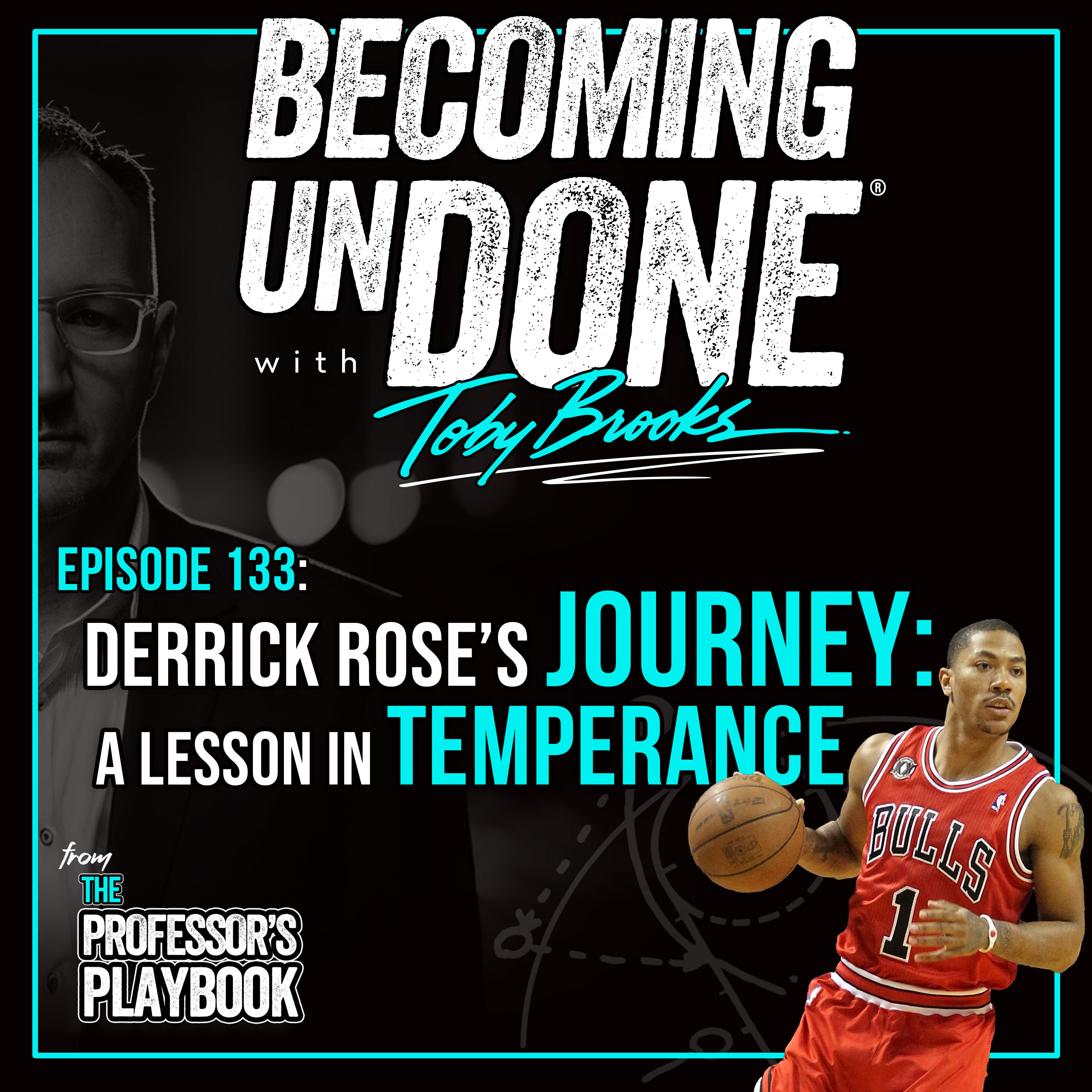
About the HOST
Dr. Toby Brooks is a seasoned expert in athletic training, sports medicine, and movement science. He is well-respected in his field for his deep understanding of sports injuries, rehabilitation, and the virtues necessary for effective clinical practice. He is the host of The Professor’s Playbook and the podcast Becoming UnDone, where he synthesizes complex sports and medical topics into actionable advice. His expertise is rooted in a thorough knowledge of biomechanics and a commitment to fostering long-term health in athletes.
Episode Summary
In this episode of Becoming UnDone: From the Professor’s Playbook, host Dr. Toby Brooks takes a deep dive into the concept of temperance within the context of athletic training and sports medicine, using NBA star Derrick Rose’s career as a pivotal case study. At the height of his career, Rose faced a life-altering ACL injury that forced him to choose between short-term success and long-term health, a choice emblematic of temperance, which Brooks explores as a critical virtue for healthcare professionals. Through a detailed exploration of Derrick Rose’s journey, Dr. Brooks weaves in the broader implications of temperance, both in decision-making processes and professional boundaries within sports medicine.
Brooks discusses the pressures athletes and clinicians face to fast-track recovery to return to competition, highlighting Derrick Rose’s controversial decision to undergo a full meniscus repair instead of quicker-fix surgeries. The episode further delves into the broader relevance of temperance in maintaining ethical standards, navigating professional boundaries, and fostering lasting trust between clinicians and their patients. Filled with insightful commentary, Brooks frames his discussion with philosophical and ethical perspectives, bringing in Greek philosophy and biblical teachings to ground his arguments on temperance as balance and measured action. The episode not only highlights the moral complexity of sports medicine decisions but also offers actionable guidance for restoring balance in clinical practices.
Key Takeaways
- Derrick Rose’s journey underscores the critical importance of temperance—a virtue reflecting balance and long-term thinking in decision-making.
- Decision-making in sports medicine should focus on long-term health over short-term gains to ensure the well-being of athletes.
- Professional boundaries and ethical practices in healthcare are essential, requiring restraint and careful judgment to maintain trust.
- Clinicians must balance empathy with clear judgment to avoid becoming over-identified with their patients, thereby maintaining professional effectiveness.
- Temperance is not simply about withholding desires but making the “right” decisions that align with ethical responsibilities and patient care.
Notable Quotes
- “They don’t come much more idiotic than Skip Bayless or Stephen A. Smith.” — Toby Brooks
- “Temperance isn’t about less; it’s about right. The right measure, the right moment, the right motive.” — Toby Brooks
- “That sweet spot. That’s compassionate clarity and it’s cool-headed confidence.” — Toby Brooks
- “Temperance helps you hold the line…It says I care, but I also have a job to do and I’ll do it with integrity.” — Toby Brooks
- “He knew that a short-term return could cost him his entire career…just because you can doesn’t always mean you should.” — Toby Brooks
Resources
- Connect with Dr. Toby Brooks on Linktr.ee for more insights and updates.
- Subscribe to “The Professor’s Playbook” and “Becoming Undone” on Apple Podcasts, Spotify, or iHeartRadio for more episodes.
Engage with the complete episode for a comprehensive exploration of temperance in sports medicine and stay tuned for future enlightening discussions with Dr. Toby Brooks.
| Timestamp | Summary |
|---|---|
| 0:10 | Derrick Rose’s Rise, Fall, and Resilience in the NBA |
| 3:46 | Derrick Rose’s Injury Choices and Career Longevity |
| 5:52 | Derrick Rose’s Career: A Tale of Potential and Sacrifice |
| 7:55 | Mastering Temperance in Athletic Training and Sports Medicine |
| 11:32 | Staying Anchored Amid Pressure and Complexity |
